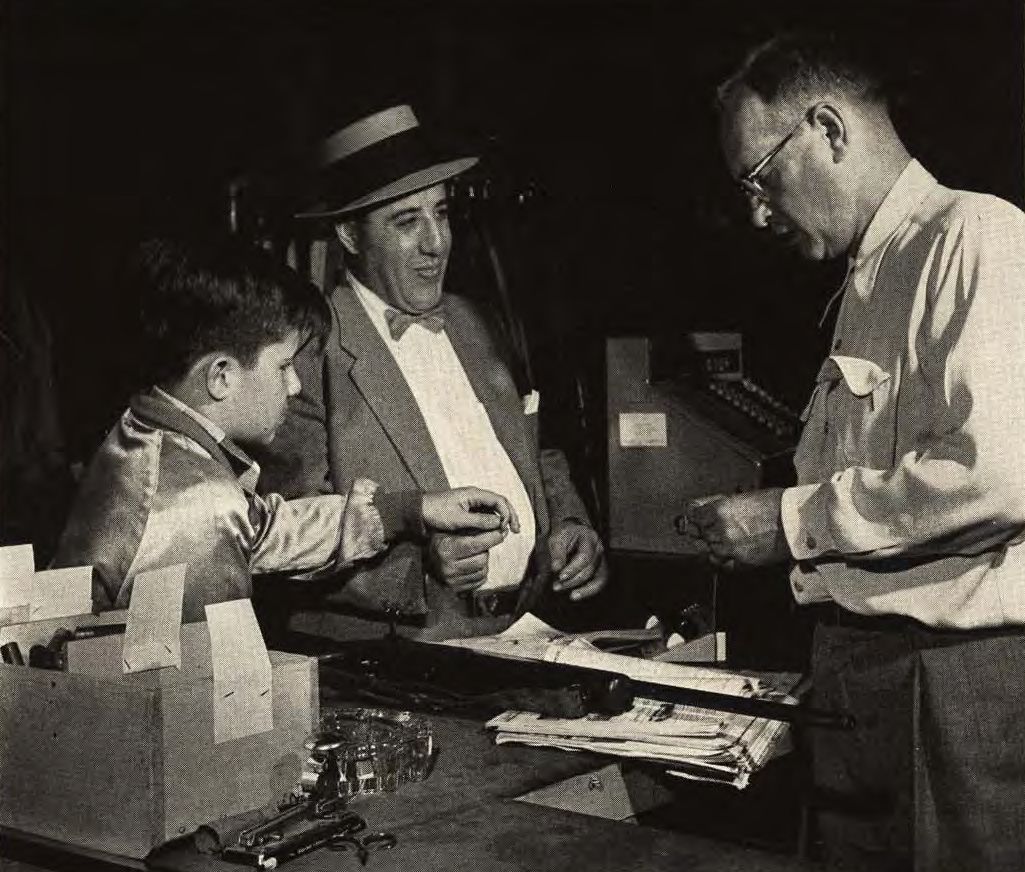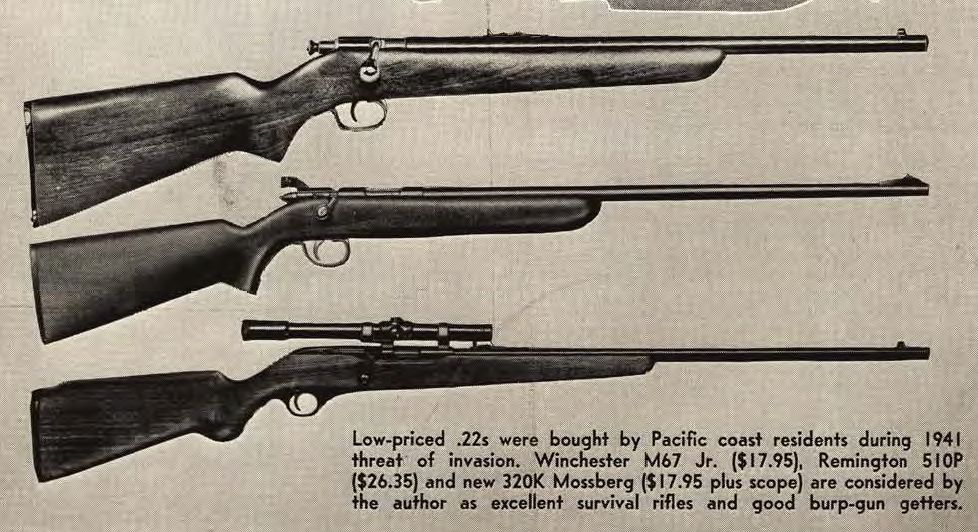.22s for Survival? By Alfred J. Goerg WANNA BUY A .22 RIFLE? |
|---|
|
I had just finished reading the above, part of an editorial in the Seattle Post Intelligencer, when this man came into my store. I was thinking, "Yeah, they can lob something a lot worse than shells -- and they can land troops, too." I was remembering that I, and my neighbors all up and down the West Coast (and I'm speaking of the United States, not Hawaii) lost a good many hours of sleep back in those days, tossing and turning and wondering just what the hell we'd do if a squad of Japanese Marines appeared suddenly on our doorsteps. It was a thought that produced a most unpleasant butterflies-in-the-stomach feeling. Had we known then, as we learned from sources of some authority later, that our own military wheels were then admitting, secretly of course, that our whole West coast would have to be considered 'expendable' in the event of enemy invasion, those butterflies in our stomachs would have been a lot larger and a lot more active! Even so, I remember very well the evening we had our first blackout. I was driving home from work in total darkness -- with a .257 Roberts rifle in my car with a .38 Special revolver tucked under my waistband. This sounds funny? Listen, friend, it wasn't funny then; not to people who could look out over that cold and suddenly forboding water we call the Pacific. The Army didn't think it was funny. Army trucks with dimmed lights rumbling along the highways at night, fox holes in empty lots, machinegun and cannon emplacements manned day and night by soldiers ready for battle -- these weren't funny. We lived month after month with these reminders of our vulnerability. No, the Japs never came. Maybe enemy soldiers never will come knocking at our doors. They've come knocking at a lot of doors in a lot of countries ... but of course, this is America, and maybe it won't happen here... But I was telling about this man who came into my store. He looked like any other outdoor type: sandy hair, blue eyes, tanned skin; an average sort of fellow. He was friendly, intelligent, maybe forty, with the look of a family man. But he had been in my store several times before, and his visits had puzzled me. "Has my single-shot Stevens rifle come yet?" he asked me. It was there, and I turned to get it. The thing that had puzzled me was this: this same man had ordered, received, and paid for exactly four other single-shot .22 rifles in he past four weeks. One each week. With each rifle, he had bought a carton (500 cartridges) of high speed, hollow point, Long Rifle ammunition. I laid the new rifle on the counter.
Now, what a customer buys in my sport shop is his business, and I make it a practice not to be nosey. But this was something else again. "You must he turning vour whole family into expert target shots, with all these rifles and all the ammo," I said, chattily. He gave me a long, steady look, and then he chuckled. "I don't blame you for being curious," he said. "First, mind telling me how long you've lived here?" "All my life," I said, "except for a few mistakes that didn't last long or add up to much." He nodded. "So you were here during and after the bombing of Pearl Harbor." He took my nod in stride and went on: "So was I, I was in uniform, with one of the first outfits sent into this area. I did duty as a machine gunner in one of the emplacements just outside this town a ways. Fell in love with the country and the people in it -- married one, as a matter of fact -- and now I'm making my home here. Got two kids." He leaned forward, resting a big hand on the counter. "You know," he said, "things really worry me. Sputnik - intercontinental missiles - smaller missiles with H warheads that can be launched from submarines -- big, fast, jet planes and big, fast, jet subs that can carry troops and . . . things . . . It isn't that I don't have a lot of confidence in our defenses. And I'm not what you'd call a worrying sort of man, ordinarily. But I keep thinking . . . "The way it could happen, a man might feel a slight earth-tremor -- or he might not; and if he did, it wouldn't mean much to us West Coasters -- and the next thing he'd know, the radio might be telling him to take it easy and not worry but there's enemy troops landed let's all be sensible and not panic and if enemy troops appear, don't resist them . . ." His face looked sort of bleak, and I was feeling sort of butterflies-in-the-stomach again, myself. "You know, I saw some places where people took advice like that, and didn't resist the invaders. I wouldn't like to have what happened to them happen to my family." He picked up the little rifle and ran his hands along the barrel. "A man is the most dangerous game there is," he said, "but you don't have to think of him the way you do about taking wild game. War is not a sport. You don't have to figure on 'clean, one-shot kills.' And you don't have to figure on shock and stopping power either, the sort of war I'm thinking of. Because if the enemy gets that close to you, you've had it." He stopped for a minute, and I was afraid he was through talking. But he wasn't. He said, "The way I figure, if we fight again soon it will be -- well, a religious war. What we believe in, against people who believe in nothing but force. We built our government and our laws on what we believed. The men who drew up our Constitution and our Bill of Rights were, by and large, god-fearing men. They weren't planning conquests, or invasions of other peoples rights; but they were strong men, too, and they didn't figure we should be sitting ducks. They wrote in the Bill of Rights that 'the right to bear arms shall not be infringed.' " He put the rifle back on the counter. "These are real handy little guns," he said. "Man who knows how to shoot, who knows the country, knows how to get around in the woods a little -- he could do a lot with one of these. He could feed his family, for one thing; birds, small game, frogs. If he was careful, he could do the enemy some damage, too. One of these little slugs will kill a man, all right; kill him instantly, if you hit him right; but, instantaneously or not, it'll kill him. The sound doesn't travel far . . . I know; it sounds melodramatic, maybe even crazy. But-order me another one of these, will you? I'll be in again next week. I'm getting my neighbors interested in this, too. You may sell a lot of these rifles -- I hope." And he walked out. Yeah, it does sound crazy. I laughed some, right after the man left. But what he said stuck with me. A few days later, target shooting in an abandoned air strip revetment (another reminder of those "dark days subsequent to Pearl Harbor") I quit my usual careful practice on paper targets and took a sort of refresher course on the effects of the lowly .22 rimfire cartridge. I shot into logs, cans of water, piles of dirt. A few days later the grouse season opened and I went out to wander around a bit, carrying a .22 Smith & Wesson revolver. I learned that the high speed .22 Long Rifle hollow point bullet will pin down heavy 2½ to 3 pound blue grouse at a distance of 50 yards with body shots. The hollow point slugs break up and break bone, preventing escape. The 22 shorts in the low speed loads without hollow points would shoot on through. I can remember when it was still legal to shoot deer in this state with the .22 rimfire, and I was recalling now that a lot of people did just that, and killed deer. A good rifleman can place a bullet at the base of the ear on a standing animal, into a channel that leads directly to the brain. So hit, even a big buck drops instantly. I began to realize that I had let myself forget some old but still basic facts. I took a copy of my own book, "Pacific and Northwest Hunting," off the shelf and spent an hour leafing through it. I had written this book and then let modern lore about high speed ballistics crowd out of my memory the older knowledge of the potency of small bullets combined with accuracy. Back at the store, I paged through some catalogues, studying the various .22 single shot rifles. They're cheap, simple, not much care needed, not much to get out of order. It would be against the law, of course, as things stand now, but a man with a hacksaw, in an invaded country, could turn some of those rifles into very concealable handguns. I got to thinking what a rough time the Nazis might have had if every Norwegian, for example, had been able to dig up out of his back yard and use such a weapon . . . I ordered two rifles. I've hesitated for a long time about this story, whether to write it or not. I know how fantastic it seems, at first glance. It seemed fantastic to me, at first. But -- A man can provide meat for himself and his family with a .22 rifle, in the right country; that is proven. A rabbit or a grouse (or a chicken or a pig that used to belong to somebody but now doesn't) could be worth more than money under certain conditions. Nobody is suggesting that .22's should be or could be the weapons of national defense, but enough of them, in the right hands, could provide a lot of harassment. Worse weapons were used, used effectively, in Europe, against invading troops. Anyway, this man I was telling you about was in again just a few days ago. He bought another .22 rifle and another carton of ammunition. I've been selling quite a few single shot .22's lately, to various people. Maybe the idea isn't so crazy, after all. |

